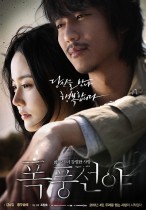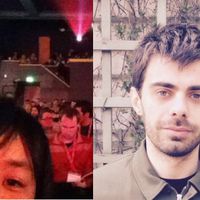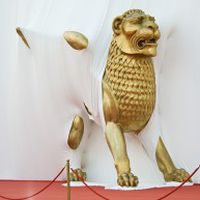Loneliness from West to East | 'Han', the Korean loneliness emotion and its meaning for the European audiences

Contributed by Florentina Heroiu
"We - the Koreans - were born from the womb of Han and brought up in the womb of Han."
Poet Ko Eun
Why is Korean Cinema so popular amongst the Western audiences? Perhaps the answer lies in its distinct vibration and use of a universal language that is understood worldwide. The Korean filmmakers discern that the film should become a unifying "universal language" where memory (emotions and feelings) is a mythical place of reconciliation. Korean Cinema has an inimitable style in strict relation with its own historical and cultural traditions: identity, authenticity, candour, responsibility, affiliation, metamorphoses, poetry, nostalgia, passion, and fury. The Korean film is not merely a distinguishing genre, but it has faith, voice and soul in each photogram: the description of human being’s emotional relationship with his people, nature and his own wonder.
Since always, every culture had a bestiary, Korean culture has two essential leitmotiv emotions: Han and Jeong.
Jeong means “Korean connection feeling” of friendliness or connection with everything that interacts with us; is a feeling of deep association with somebody or something to the point that it is a part of you and it is inseparable. We can feel Jeong for other people, nature, animals, birds, insects and things.
Han emotion is deeply rooted in the history and consciousness of Korean people. Loneliness, solitude, deep regret, pride, verticality, dignity, loyalty, pride, passion, revolt, despair, powerlessness, unfulfilled broken dreams, resentment, waiting or in one word, a “torch” in the deep night of the soul. Roughly similarities can be found in Romanian with "dor si jale" or in French with the mélancolie (spleen) of Beaudelaire. For Korean people these are not lost causes. Self-pity is not an excuse to do nothing. To urge for sympathy for pity's sake is to seek affirmation of the choice to do nothing. They are empowered by the spirit and the thought of a meaningful experience and so they, bit by bit, transform their life with a deep silent resilience.
Korean cinema has remarkable directors, scriptwriters and composers, nonconformists alternating loneliness and solitude, who have a definite attitude of swimming against the commercial Western stream such as Jo Chang-Ho with ”폭풍전야” - “Lovers Vanished” (2010), an unusual film about love, grief, remorse and hope without an upcoming tomorrow. Exploration of guilt and identity, Song Il-Gon with “오직그대만” - “Always” (2011), a sad romance between an ex-boxer who has closed his heart to the world and a blind telemarketer.
The Korean composers re-define the role of music in cinema. Most films reach the top because their OST/music quickly turns into hits. At same time, music becomes a key and an equal partner to the actor, with its own role/main character on the spectator. From "expressive” value, film music becomes a "representative" value. Some popular Korean soundtracks has come from composer Bang Jun Seok though films such as Always (2011), Go go 70 (2008), Nowhere to turn (2008), Eye for an eye (2008), Sunny (2008), Like father, like son (2008), Paradise Murdered (2007), Who are you ? (2002) and Yiruma who composed Doggy Poo (2004), Oasis (2002), Winter Sonata (2002)
Attractiveness for different sad stories and poignant movies is based on music, but also on the actors and their talent, acting, looking, voice, tears or sad smile. Nowadays Westerns encounter the Han-emotion through films and dramas with non-conformist actors, like Kim Nam-gil, the “Hero With A Thousand Faces”, a young actor that still has the joy of playing, with a pure innocence, like a child within his heart, but who is also a restless temperamental artist, having a strong and a rebellious personality, with still a fresh look upon his artistic gift.
Open-mind people can be taught by Han. By understanding the humanness of Han, the “civilized” Westerns can learn more about respect, the first step towards the big globalisation. Even with the gloomy, sad, depressing, painful, or distressing atmosphere and the main characters that are almost constantly disappearing or dying, the Western spectator is thankful for Korean movies, in part because he found again what had been lost: authentic solidarity & distinctiveness, the respect for ancestors and their history, silent dignity and solemnity. Through the Han emotion, the Korean cinema brought on a new passion and mentality about loneliness & solitude, a distinctive approach of the creative relation between the past, present and future. For all that, we feel tenderness for Asian cinema and we live along with Han. We care for the equilibrium and the balanced attitude from the Korean cinema.

Han teaches us about how to respond to suffering & sorrow without vengeance. The Han emotion can train us how to wisely break the violent behaviour, aggression, hostility, brutality, and cruelty. Day after day, the New Korean Cinema refines also through his interconnections with other important milestone films from all over the world: the same thoughts of singular filmmakers (Wong Kar-wai, Kiju Yoshida, Raúl Ruiz, Gregory Colbert, Edgar Reitz, Éric Valli, Alain Resnais, Joseph Losey, Stanley Kubrick, Mona Achache etc.), their personal artistic universe being revealed to have the same credo, faith & path. Through Jeong and Han, Korean films incite to a new reading overlooked in History.
Formerly the historic movie did not have many fans. Today, thanks to Korean cinema, the taste and the understanding of the public has changed, a bright new vision and assignment of the historical movie genre has taken in: moral values, respect, archetype, benchmark for the future generations. Far away from Western countries, a little country with unique realms stubbornly resists defending her cultural identity. Along with India, France and Germany, South Korea is one of the few countries in the world that managed to resist - truly & strongly - to the Hollywood's hegemony. And now, over the rainbow the booming South Korea is the lucky shinning star of the new cinema industry.
Florentina Heroiu Ph.D. is currently full time a screenwriting professor at the National University of Film and Theatrical Arts “I.L. Caragiale”- Romania and a part-time Creative consultant & Script Advisor-Story Analyst, Film critic and Head Writer.
Similar content
By Kerrine Goh
11 May 2016
posted on
19 Aug 2012
By Kerrine Goh
04 Sep 2012
By Ramona David
23 Feb 2011
By Kerrine Goh
03 Jun 2005



